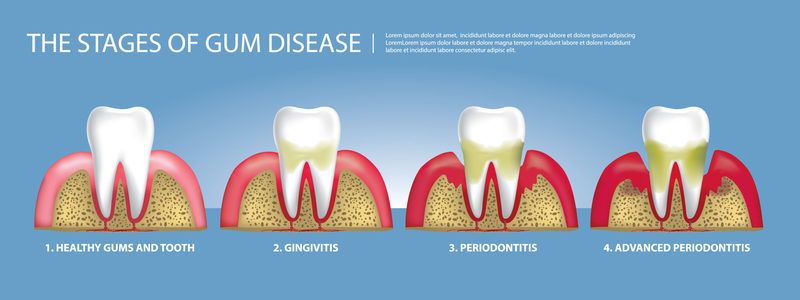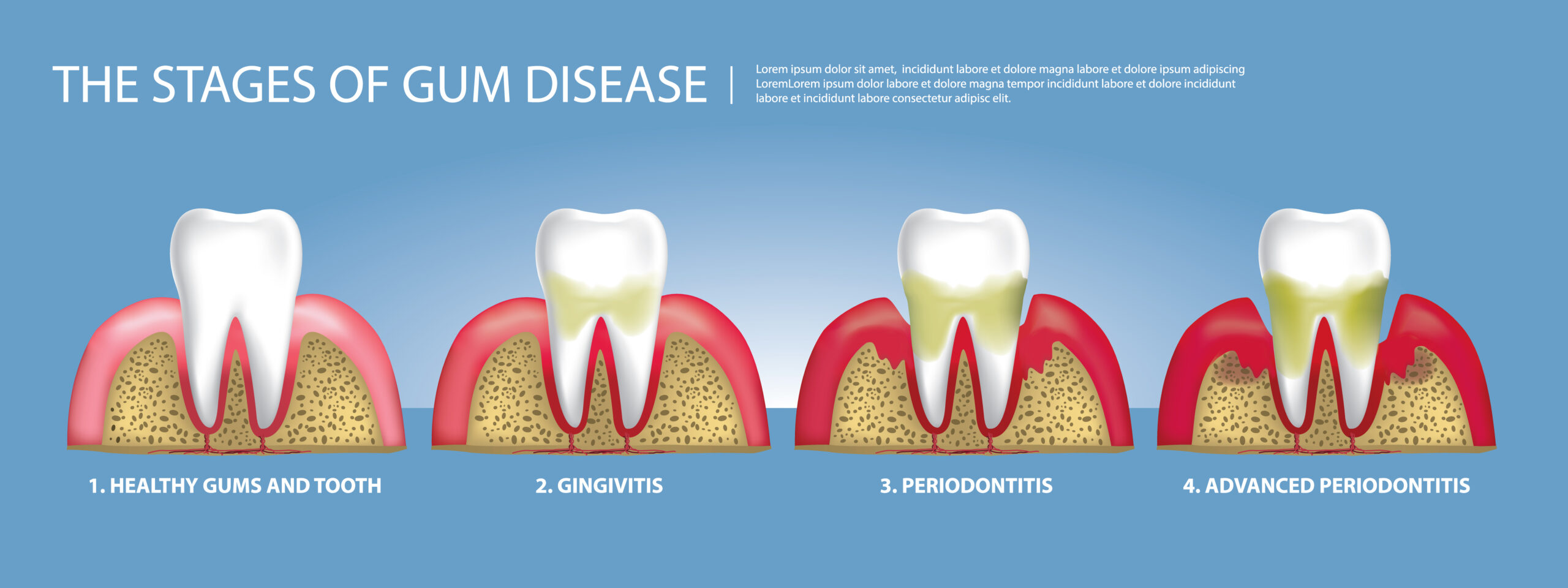
Did you know that tooth decay and gum disease can pose serious dangers to your oral health? From painful infections to tooth loss and systemic health issues, the consequences of neglecting oral hygiene can be significant. In this article, we’ll explore the dangers of tooth decay and gum disease and why prioritizing dental health is crucial. Tooth decay occurs when bacteria erode the enamel, leading to cavities, while gum disease is an infection caused by plaque buildup. Maintaining good oral hygiene and regular dental check-ups are vital in preventing these issues and safeguarding your smile and overall well-being.

The Dangers of Tooth Decay and Gum Disease
Tooth decay and gum disease are common dental issues that affect millions of people worldwide. These conditions not only cause discomfort and pain but can also lead to serious oral health complications if left untreated. In this article, we will explore the dangers of tooth decay and gum disease, their impact on overall health, and the importance of preventive measures to maintain good oral hygiene.
The Impact of Tooth Decay
Tooth decay, also known as dental caries, is the destruction of the tooth’s enamel, which is the hard outer layer that protects the inner layers of the tooth. When plaque, a sticky film containing bacteria, builds up on the teeth, it produces acids that erode the enamel, leading to cavities. If left untreated, tooth decay can progress and affect the deeper layers of the tooth, causing pain, sensitivity, and even tooth loss.
The dangers of tooth decay extend beyond oral health.
Research has shown that untreated tooth decay can have systemic effects on overall well-being. The bacteria involved in tooth decay can enter the bloodstream and contribute to the development of cardiovascular (heart) diseases, respiratory (lung) infections, and even complications during pregnancy.
This highlights the need for early detection and treatment of tooth decay to prevent its detrimental consequences.
Preventing Tooth Decay
Prevention is key when it comes to combating tooth decay. Here are some essential steps to maintain good oral hygiene and prevent tooth decay:
1. Brushing and flossing: It is crucial to brush your teeth at least twice a day and floss daily to remove plaque and food particles from hard-to-reach areas.
2. Fluoride toothpaste: Use a fluoride toothpaste that helps strengthen the enamel and protect against tooth decay.
3. Regular dental check-ups: Visit your dentist regularly for check-ups and professional cleanings to detect and address any signs of tooth decay early on.
4. Balanced diet: Limit sugary and acidic foods and beverages, as they contribute to the formation of plaque and tooth decay. Opt for a well-balanced diet that includes fruits, vegetables, and dairy products for optimal oral health.
The Dangers of Gum Disease
Gum disease, also known as periodontal disease, is an infection of the tissues surrounding the teeth. It is caused by the buildup of plaque and tartar along the gumline, leading to inflammation and eventual damage to the gums and underlying bone structure. If left untreated, gum disease can result in tooth loss and has been linked to various systemic conditions.
One of the most significant dangers of gum disease is its impact on overall health.
Research has shown a strong association between gum disease and an increased risk of cardiovascular disease, respiratory infections, diabetes, and adverse pregnancy outcomes.
The inflammation caused by gum disease can contribute to the development and progression of these systemic conditions, highlighting the importance of maintaining healthy gums.
Preventing Gum Disease
Preventing gum disease involves adopting good oral hygiene practices and seeking professional dental care. Here are some preventive measures to keep your gums healthy:
1. Proper brushing and flossing: Brush your teeth at least twice a day and floss daily to remove plaque and prevent its buildup along the gumline.
2. Regular dental cleanings: Schedule regular dental cleanings with your dentist or dental hygienist to remove plaque and tartar that cannot be removed through regular brushing and flossing.
3. Quit smoking: Smoking is a significant risk factor for gum disease. Quitting smoking can significantly reduce your risk and improve your overall oral health.
4. Balanced diet: A nutritious diet plays a crucial role in maintaining healthy gums. Include foods rich in vitamins and minerals, such as fruits, vegetables, and whole grains, to support gum health.
By taking proactive measures to prevent tooth decay and gum disease, you can safeguard your oral health and reduce the risk of associated systemic complications. Remember to maintain a consistent oral hygiene routine, visit your dentist regularly, and make healthy lifestyle choices to protect your teeth and gums.
The Dangers of Tooth Decay and Gum Disease
- Tooth decay can lead to painful cavities.
- Gum disease can cause bad breath and bleeding gums.
- If left untreated, tooth decay can result in tooth loss.
- Gum disease has been linked to other health issues like heart disease.
- Regular brushing, flossing, and dental check-ups can help prevent tooth decay and gum disease.
Frequently Asked Questions
Here are some frequently asked questions about the dangers of tooth decay and gum disease:
What are the causes of tooth decay and gum disease?
Tooth decay and gum disease can be caused by a variety of factors. Poor oral hygiene, such as not brushing and flossing regularly, can lead to the buildup of plaque and tartar, which can damage the teeth and gums. Additionally, consuming sugary and acidic foods and drinks can contribute to tooth decay. Certain medical conditions, such as diabetes, can also increase the risk of gum disease.
Furthermore, smoking and tobacco use have been linked to an increased risk of both tooth decay and gum disease. These habits can weaken the immune system and hinder the body’s ability to fight off infections. Overall, a combination of poor oral hygiene, unhealthy diet, and lifestyle choices can contribute to the development of tooth decay and gum disease.
What are the dangers of untreated tooth decay?
Untreated tooth decay can have serious consequences for your oral health. As the decay progresses, it can reach the inner layers of the tooth, including the pulp and nerves. This can lead to severe toothaches, sensitivity to hot and cold temperatures, and even tooth loss. Infections can also occur, causing abscesses and swelling in the surrounding tissues.
Furthermore, untreated tooth decay can affect your overall health. The bacteria that cause tooth decay can enter the bloodstream and spread to other parts of the body, potentially leading to systemic infections. Research has also shown a link between untreated tooth decay and an increased risk of cardiovascular disease, diabetes, and respiratory infections. Therefore, it is crucial to address tooth decay promptly to prevent further complications.
What are the risks of untreated gum disease?
Untreated gum disease, also known as periodontal disease, can have serious consequences for your oral health. It starts with gum inflammation, known as gingivitis, which can cause red, swollen, and bleeding gums. If left untreated, it can progress to periodontitis, where the gums pull away from the teeth, forming pockets that become infected.
Untreated gum disease can lead to the loss of teeth as the infection destroys the supporting structures, including the bone and connective tissues. Additionally, the bacteria from the infected gums can enter the bloodstream and travel to other parts of the body, increasing the risk of systemic health issues. Research has linked untreated gum disease to heart disease, stroke, diabetes, respiratory infections, and complications during pregnancy. Therefore, it is essential to seek treatment for gum disease to prevent further damage.
How can tooth decay and gum disease be prevented?
Preventing tooth decay and gum disease starts with practicing good oral hygiene. This includes brushing your teeth at least twice a day with a fluoride toothpaste, flossing daily, and using mouthwash to remove plaque and bacteria. Regular dental check-ups and professional cleanings are also crucial for early detection and treatment of any oral health issues.
In addition to oral hygiene, maintaining a healthy diet is important. Limiting the consumption of sugary and acidic foods and drinks can help prevent tooth decay. Quitting smoking and tobacco use can also significantly reduce the risk of gum disease. Lastly, managing any underlying medical conditions, such as diabetes, can help lower the risk of oral health problems.
When should I seek professional help for tooth decay or gum disease?
If you suspect you have tooth decay or gum disease, it is important to seek professional help as soon as possible. Common signs of tooth decay include tooth sensitivity, toothaches, visible holes or pits in the teeth, and dark spots or staining. Signs of gum disease include red, swollen, and bleeding gums, bad breath, receding gums, and loose teeth.
By addressing these symptoms early on, you can prevent further damage to your teeth and gums. A dentist will be able to diagnose the issue and recommend appropriate treatment, such as fillings for tooth decay or deep cleaning and antibiotic therapy for gum disease. Remember, early intervention is key to preserving your oral health.
How poor oral health affects the rest of you
Final Thoughts: The Dangers of Tooth Decay and Gum Disease
In summary, tooth decay and gum disease pose significant risks to both oral and overall health. Neglecting dental care can lead to painful procedures and systemic health issues. Prioritize regular dental check-ups, maintain good oral hygiene, and adopt a balanced diet to safeguard your smile and well-being.
Call or Book appointment online
:Ace Dental Care Alpharetta office: 678-562-1555 - Book Now
Ace Dental Care Norcross office: 770-806-1255 - Book Now
Disclaimer
This blog post was generated by artificial intelligence. The content of this post may not be accurate or complete, and should not be relied upon as a substitute for professional advice. If you have any questions about the content of this post, please contact us.
We are constantly working to improve the accuracy and quality of our AI-generated content. However, there may still be errors or inaccuracies. We apologize for any inconvenience this may cause.





